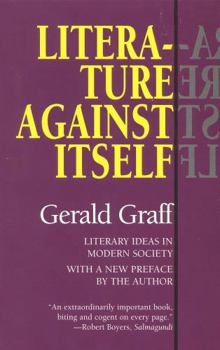Literature Against Itself: Literary Ideas in Modern Society
Select Format
Select Condition 
Book Overview
Since its first publication more than fifteen years ago, Literature Against Itself has achieved wide recognition as the first major critique of post-1960s cultural radicalism--and still, one of the best. In it, Gerald Graff argues that the reigning strategies for defending literature now end up by trivializing it, and he analyzes why and how they have gone wrong. He charges that our leading literary critics, whether they claim to be traditionalists...
Format:Paperback
Language:English
ISBN:1566630975
ISBN13:9781566630979
Release Date:August 1995
Publisher:Ivan R. Dee Publisher
Length:276 Pages
Weight:0.70 lbs.
Dimensions:0.8" x 5.4" x 8.4"
Customer Reviews
2 ratings
Gerald Graff and the Future of Critical Pedagogy
Published by Thriftbooks.com User , 15 years ago
In his early books, Literature Against Itself: Literary Ideas in Modern Society (1979) and Professing Literature: An Institutional History, Twentieth Anniversary Edition (1987), Graff took as his main subjects literary theory and the institutional history of departments of English and literature, respectively. LITERATURE AGAINST ITSELF continues to be of interest and value for its discussion and analysis of competing schools of literary theory; and the historical narrative of the history of the post-secondary teaching of English that informs PROFESSING LITERATURE continues to enlighten anyone interested in curriculum design and canon-making. But perhaps these two early books can also be appreciated for their having afforded Graff the opportunity to work out the foundational arguments and historical perspectives that enabled him in his later books -- Beyond the Culture Wars: How Teaching the Conflicts Can Revitalize American Education (1992) and Clueless in Academe: How Schooling Obscures the Life of the Mind (2003) -- to effectively argue and explain why students across the curriculum would benefit from a more critical style of pedagogy. In LITERATURE AGAINST ITSELF Graff analyzes the premises, conclusions, and implications of various literary theories and contemporary schools of criticism in terms of their validity and effectiveness for pedagogy and criticism. And in PROFESSING LITERATURE Graff shows how the various teaching methods and choices of texts in departments of literature from the nineteenth though the early twentieth century suggest that new methods and new canons of study-worthy texts will continue to appear. In the more recent Beyond the Culture Wars: How Teaching the Conflicts Can Revitalize American Education (1992), Graff foregrounds the conclusions and pedagogical injunctions proffered in his earlier books. In the decade following the publication of Beyond the Culture Wars, Graff himself decided to put the pedagogical injunctions based on his conclusions into practice, coediting, with James Phelan, two "critical controversy" textbooks: The Adventures of Huckleberry Finn (Case Studies in Critical Controversy) and The Tempest: A Case Study in Critical Controversy (Case Studies in Critical Controversy). Both of these textbooks are in their second editions. In his most recent book, Clueless in Academe: How Schooling Obscures the Life of the Mind (2003), Graff continues to explore the pedagogical implications of what he discovered in researching and writing his earlier books on theory and the institutional history of literature departments. Teaching the controversies or conflicts has ironically even been taken up by a group which eschews rational argument -- a sine qua non of Graff's critical pedagogy: religious fundamentalists. I would agree to a certain extent with anyone who thinks it unfortunate that some religious fundamentalists -- in their efforts to get creationist mythology (intelligent design) taught in public school sci
An outstanding book about literary theory
Published by Thriftbooks.com User , 21 years ago
This is an outstanding book about literary theory and the academy. A professor of mine recommended it to me as an undergraduate, along with Terry Eagleton's Literary Theory: An Introduction, and I found this one to be the more interesting, the more original, of the two. It is at once a history and a critique and has much to offer students and scholars alike. Unfortunately, Graff seems to have fallen prey in his later work to some of the sophistries that he criticized in this early work.





